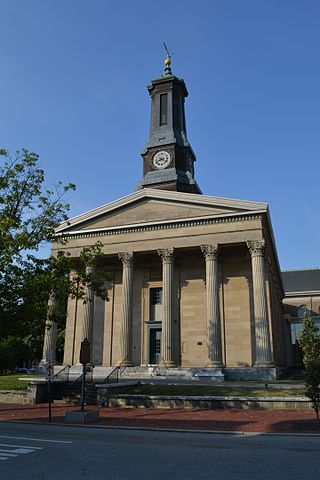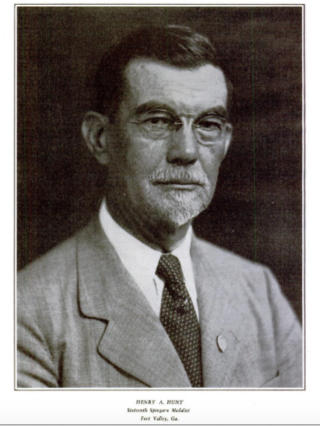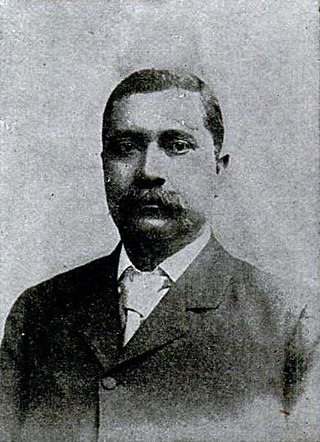
Chester County, colloquially referred to as Chesco, is a county in the Commonwealth of Pennsylvania. It is located in the Delaware Valley region, located in the southeastern part of the state. As of the 2020 census, the population was 545,823. increasing by 7.1% from 498,886 in 2010. The county seat is West Chester. The most populous of the county's 73 municipalities, including cities, boroughs, and townships,) is Tredyffrin Township. The most populous boroughs are West Chester and Phoenixville. Coatesville is the only municipality in the county that is classified as a city.

Greenville is a bedroom community in New Castle County, Delaware, United States, and a suburb of Wilmington. The population was 2,326 at the 2010 census. For statistical purposes, the United States Census Bureau has defined Greenville as a census-designated place (CDP). The community is also home to the private residence of Joe Biden, the 46th and current president of the United States, and many Du Pont family descendants.

Wilmington is the most populous city in the U.S. state of Delaware. The city was built on the site of Fort Christina, the first Swedish settlement in North America. It lies at the confluence of the Christina River and Brandywine Creek, near where the Christina flows into the Delaware River. It is the county seat of New Castle County and one of the major cities in the Delaware Valley metropolitan area. Wilmington was named by Proprietor Thomas Penn after his friend Spencer Compton, Earl of Wilmington, who was prime minister during the reign of George II of Great Britain.

Downingtown is a borough in Chester County, Pennsylvania, United States, 33 miles (53 km) west of Philadelphia. As of the 2020 census, it had a population of 7,898. Downingtown was settled by European colonists in 1716 and has a number of historic buildings and structures.

East Brandywine Township is a township in Chester County, Pennsylvania, United States. The population was 9,741 at the 2020 census.

The University of Massachusetts Amherst is a public land-grant research university in Amherst, Massachusetts, United States. It is the flagship campus of the University of Massachusetts system, and was founded in 1863 as the Massachusetts Agricultural College. It is also a member of the Five College Consortium, along with four other colleges in the Pioneer Valley.

Brandywine Creek is a tributary of the Christina River in southeastern Pennsylvania and northern Delaware in the United States. The Lower Brandywine is 20.4 miles (32.8 km) long and is a designated Pennsylvania Scenic River with several tributary streams. The East Branch and West Branch of the creek originate within 2 miles (3 km) of each other on the slopes of Welsh Mountain in Honey Brook Township, Pennsylvania, about 20 miles (32 km) northwest of their confluence.
Brandywine Hundred is an unincorporated subdivision of New Castle County, Delaware, United States. It is located to the north and northeast of the city of Wilmington. Hundreds were once used as a basis for representation in the Delaware General Assembly. Brandywine Hundred and North Wilmington are commonly used colloquial names for this area. However, while their names still appear on all real estate transactions, all other hundreds in Delaware presently have no meaningful use or purpose except as a geographical point of reference. In the 2010 census, Brandywine had 77,182 people.

Delaware County Community College (DCCC) is a public community college with campuses and facilities throughout Delaware and Chester Counties in Pennsylvania. DCCC was founded in 1967 and is accredited by the Middle States Commission on Higher Education. The college offers 53 associate degree programs and 43 certificate programs at nine different locations.
Brandywine Springs is a historic area near Newport, Delaware, along the Red Clay Creek.

Henry Alexander Hunt was an American educator who led efforts to reach blacks in rural areas of Georgia. He was awarded the Spingarn Medal by the National Association for the Advancement of Colored People (NAACP), as well as the Harmon Prize. In addition, he was recruited in the 1930s by President Franklin D. Roosevelt to join the president's Black Cabinet, an informal group of more than 40 prominent African Americans appointed to positions in the executive agencies.

The Chestnut Ridge Historical Area contains a number of the oldest buildings on the University of Massachusetts Amherst campus in the US, including its iconic chapel, the campus war memorial, the W. E. B. Du Bois Library and the last remaining barn from the founding years of the Massachusetts Agricultural College.

Helen Eugenia Hagan was an American composer, pianist and music educator of African descent.
The New Africa House, formerly known as Mills House, is an academic building and former dormitory of the University of Massachusetts Amherst built in the Georgian revival style with Art Deco accents. It is part of the Central Residential Area at the University of Massachusetts Amherst. It was designed by Louis Ross, who designed many of the dormitories on campus as well as the Student Union.
The Middle Atlantic Athletic Association formation date is unknown. An article suggests the M3A was formed in 1931–32. This association or what now are known as "conferences" was able to bring together several historically black colleges from middle eastern states to compete for titles in all sports. The Baltimore Afro-American, an African American newspaper features several articles with the teams from the M3A. It includes scores, championship and information pertaining to the schools. The schools that made up this conference were:
The Wilmington and Northern Railroad is a railway company that once owned a line from Reading, Pennsylvania to Wilmington, Delaware. The original main line from Wilmington to Birdsboro, Pennsylvania was built between 1869 and 1871 by its predecessor, the Wilmington and Reading Railroad. An extension from Birdsboro to High's Junction was completed in 1874. There the Wilmington and Reading connected with the Berks County Railroad and ran over its tracks to Reading. The Berks County Railroad was foreclosed on at the end of 1874 and reorganized as the Reading and Lehigh Railroad, under the control of the Philadelphia and Reading Rail Road. The Wilmington and Reading also experienced financial difficulties and was itself foreclosed on in 1876. It was reorganized in 1877 as the Wilmington and Northern. After the reorganization, the railroad was closely affiliated with the Reading, but retained its own organization and officers until 1898. In that year, the Reading bought a majority of the company's stock and incorporated it into its own system. The main line from Birdsboro to Wilmington became the Wilmington and Northern Branch, while the extension above Birdsboro was incorporated into the Reading Belt Line. The Wilmington and Northern continued to exist as a paper railroad within the Reading system. The portion of the Wilmington and Northern north of Modena, Pennsylvania was sold to Conrail at its formation in 1976. The line south of Modena was retained by the Wilmington and Northern, which leased and then sold it piecemeal to other railroads between 1981 and 2005. As of 2021, the Wilmington and Northern still survived as a subsidiary of Reading International, Inc.

John Sheppard Trower (1849–1911) was an American businessman, restaurateur, and founder of a school. He co-founded Downingtown Industrial and Agricultural School, in operation from 1905 until 1993. Trower was among the wealthiest African Americans in Pennsylvania and possibly the United States at the time of his death.
James H. N. Waring, also known as J. H. N. Waring, was an educator and physician who practiced in Washington, D.C., and Baltimore, Maryland. He implemented trade courses in Baltimore and studied societal pressures on African Americans. During World War II, he treated soldiers at Camp Devens during the Spanish flu epidemic. He sat on the Board of Trustees of his alma mater, Howard University.

Isaac Norton Rendall was an American Presbyterian minister and academic administrator. He served as president of Lincoln University for forty-one years (1865–1906).
















